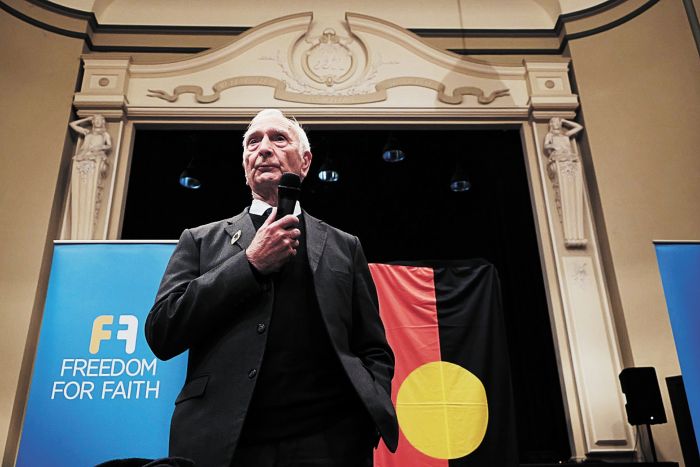Among the organisers of that January 1938 event was William Cooper, who established the Australian Aborigines League in 1932. Between 1933 and 1934 Cooper circulated a petition that collected over 1,800 signatures, asking the government to improve the living conditions of Aborigines and enact legislation that would guarantee Aboriginal representation in Parliament. (A first attempt at what the “Uluru Statement from the Heart” now proposes!) When it became clear by November 1937 that Prime Minister Joseph Lyons would not forward the petition to King George V, Cooper called a meeting in Melbourne at which Bill Ferguson and Doug Nicholls also spoke. It was decided that, when the rest of Australia celebrated the sesquicentenary with a great parade in Sydney on January 26, 1938, they would hold a Day of Mourning meeting. Denied access to the Town Hall, they marched from the Town Hall to the Australian Hall. Jack Patten chaired the meeting and with him sat Bill Ferguson, Doug Nicholls, William Cooper and Jack Kinchela. Margaret Tucker, Pearl Gibbs and Selina Patten were among the crowd of over 100 who attended. It was the world’s first civil rights march, and marked the beginning of a new era in Aboriginal activism.
Less well known is William Cooper’s response to the news of Kristallnacht, a pogrom against Jews throughout Nazi Germany on November 9-10, 1938, carried out by the original paramilitary wing of the Nazi Party and German civilians. The German authorities looked on without intervening. The name Kristallnacht comes from the shards of broken glass that littered the streets after the windows of Jewish-owned stores, buildings, and synagogues were smashed. As Abe Schwartz (a long-time friend of William Cooper’s grandson, Uncle Boydie Turner) said, Cooper “knew what racism smelled like”. He waited for protests from Australians to the attacks on Jews in Germany. Finding there were none, he went on December 6, 1938 to the German Embassy in Melbourne to deliver a letter of protest to the German Government. He was not admitted, and his letter was not accepted.

This year on September 7, another meeting took place at the Australian Hall, sponsored by Freedom for Faith and organised from Melbourne by Abe Schwartz. It brought together relatives of William Cooper, other Aboriginal people, members of the Jewish community and other faiths, and people of good will, to remember this amazing man.
Shane Phillips welcomed us to country, a group from Darlington School sang Miriam’s song, and Micah performed two songs. Shanah, a grand-daughter of William Cooper, read the preamble to the resolution passed unanimously at the meeting in this same place nearly 80 years ago.
Abe Schwartz spoke of this involvement in reconciliation with Australia’s First Nations, and the shared values held in common by Jewish and Aboriginal people. He told how in 2014, Governor General Peter Cosgrove presented the Queen with a replica of William Cooper’s 1934 petition to the King – sent by the grandson of William Cooper to the grand-daughter of King George V. The hope now is that a copy of William Cooper’s letter to the German Government in 1938 can be received at last. Uncle Boydie will attend celebrations in Israel for the centenary of the charge of the 4th Light Horse Brigade at Beersheba in 1917, in which several Aboriginal soldiers fought, together with a group of the soldiers’ descendants (including Ray Minniecon). Approaches have been made to the German government, and it is planned that Uncle Boydie will go on to Berlin to present a copy of his grandfather’s letter, which the German Embassy in Melbourne would not accept in 1938, to the current German government.
There were many other speakers at the Australian Hall event. As we sat around in a big circle we heard the Director of the Sydney Jewish Museum, Rob Schneider, 97-year-old Holocaust survivor Eddie Jacob, and a wonderful talk by Uncle Boydie. William Cooper’s granddaughter spoke of the “missing” generations who, like the stolen generations, were deprived of their Aboriginal culture, in their case by parents who wanted to spare them from racism. She didn’t know she was Aboriginal until she was 30.
There isn’t space to recount all that happened that evening, but it had me thinking of something an anthropology lecturer said a long time ago: “It’s always easier to divide people than to unite them.” That night at the Australian Hall there was an unforgettable celebration of unity! The event also raised money to help get Uncle Boydie to Israel and Germany and to document the project so that everyone can know more about a great Australian, William Cooper.





